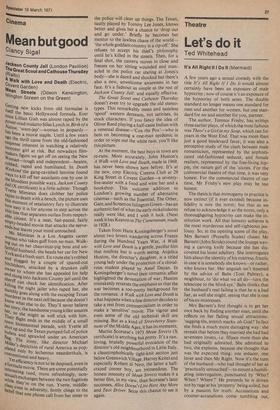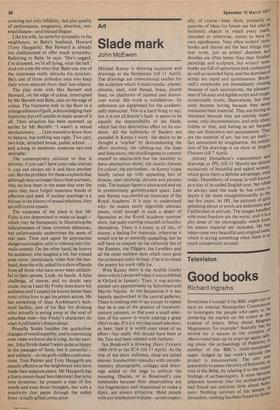Theatre
Let's do it
Ted Whitehead
It's All Right If I Do It (Mermaid) A few years ago a sexual comedy with the title It's All Right If I Do It would almost certainly have been an exposure of male hypocrisy; now of course it's an exposure of the hypocrisy of both sexes. The double standard no longer means one standard for men and another for women, but one standard for me and another for you, partner.
The author, Terence Frisby, has written three earlier plays, of which the most farhous was There's a Girl in my Soup, which ran for years in the West End. That was more than just a good boulevard farce; it was also a perceptive study of the clash between male romanticism, represented by the sophisticated old-fashioned seducer, and female
realism, represented by the free-living hippie, the nature girl of the 'sixties. For the commercial theatre of that time, it was very honest. For the commercial theatre of our time, Mr Frisby's new play may be too honest.
The thesis is that monogamy in practice is now extinct (if it ever existed) because in fidelity is now the norm; but that as we refuse to acknowledge it as the norm, only a thoroughgoing hypocrisy can make the in stitution work. All that honesty achieves is the most murderous and self-righteous jealousy. So, in the opening scene of the play, Mrs Barnett (Prunella Scales) chases Mr
Barnett (John Stride) round the lounge wav
ing a carving knife because she has discovered his latest adultery. She interrogates him about the identity of his mistress, frantic in case it is somebody she knows—or rather, who knows her. Her anguish isn't lessened by the advice of Babs (Toni Palmer), a neighbour, to 'do what we all do—turn the telescope to the blind eye.' Babs thinks that the husband's real failing is that he is a bad liar, as well she might, seeing that she is one of his ex-mistresses.
Mrs Barnett's first thought is to get her own back by finding another man, until she reflects on her fading sexual attractions: 'sagging tits, stretch marks. oh God!' In fact she finds a much more damaging way: she reveals that before they married she had had seventeen lovers, i.e. fifteen more than she had originally admitted. She admitted to two, she explains, because she thought that was the expected' thing: one seducer, one lover and then Mr Right. Now it's the turn of the husband—who had thought of her as 'practically untouched'--to mount a humiliating interrogation, punctuated by 'Who?
When? Where ?' He pretends he is driven not by rage at his 'property' being soiled, but by a passion for truth. Accusations and counter-accusations come tumbling out, covering not only infidelity, but also quality of performance, pregnancy, abortion, venereal disease—and mutual disgust.
Like his wife, he turns for sympathy to the neighbours, to Babs's husband, Howard (Tony Haygarth). But Howard is already too disillusioned to offer much sympathy. Referring to Babs, he says: 'She's sagged, I've drooped, we're all dying, what the hell.'
And not even the news that Babs was one of the mistresses really disturbs his stoicism.
He's one of those orthodox men who keep their wives separate from their lust-objects. The play ends with Mrs Barnett and Howard, on the edge of coitus, interrupted by Mr Barnett and Babs, also on the edge of coitus. The foursome sink to the floor in a strange alliance of guilt, acknowledging their hypocrisy .hut still unable to make sense of it all. Their situation has been summed up earlier by Mr Barnett : 'I wasn't a sexual revolutionary.... I just wanted to know how to behave, but nothing was right. Two cars, two kids, detached house, public school. and aching to penetrate someone new and desirable.'
The contemporary solution to that is divorce: if you can't have your cake and eat it, you can always eat it and have another one. But the problem for thesecouples is that although they no longer fancy their partners, they do love them in the sense that over the years they have forged tenacious bonds of affection and need. If nuclear marriage is a hiccup in the history of sexual relations, they are still in mid-spasm.
The weakness of the piece is that Mr Fisby is too determined to make us laugh—
which may be therapeutic in illustrating the ridiculousness of these common dilemmas, but unfortunately undermines the sense of real pain. Time and again he approaches dangerous insights, only to sidestep into formula comedy. On the other hand, he knows his audience, who laughed a lot, but winced even more: particularly when first the husband, then the wife, asked for a show ofhands from all those who have never been unfaith ful to their spouse. Look, no hands. A false challenge, of course, and no doubt very crude, but as I said Mr Frisby does know his audience and I suspect he knows better than most critics how to get his points across. He has something of Alan Ayckbourn's technical facility, and of his flair for divining what actually is eating away at the soul of suburban man—but Frisby's characters do what Ayckbourn's dream about.
Prunella Scales handles the quicksilver changes of mood superbly, and is convincing even when we know she is lying. As her part
ner, John Stride doesn't seem quite so happy in the passages of farce, but is powerful—
and pathetic—in the guilt-ridden confronta tions. Toni Palmer and Tony Haygarth are equally effective as the neighbours who have made their separate peace. Mr Haygarth has a line in moon-faced bewilderment that is his own invention : he presents a man of few words and even fewer thoughts, but with a sensitivity that peeps through the oafish front : a really gifted comic actor.



































 Previous page
Previous page